THE WINES OF
SOFIA & CHRISTINA THANISCH
BERNKASTEL, MOSEL VALLEY, GERMANY
2021 VINTAGE, EN PRIMEUR
Exclusive to Corney & Barrow in the UK
Introduction
Back in Bernkastel
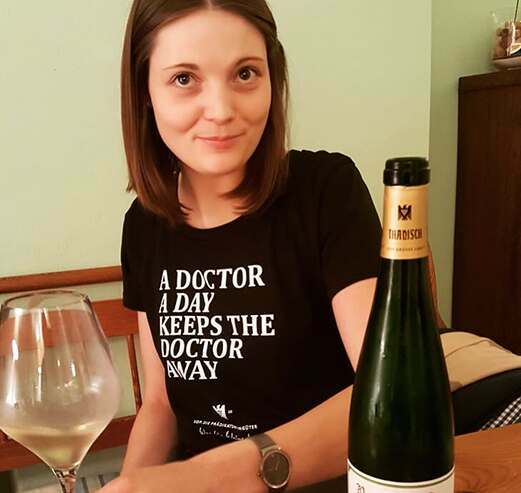
After an enforced absence during Covid, it was with frankly childish enthusiasm that Will Hargrove and I motored out of Luxembourg airport in the direction of the Mosel. The brilliant August sunshine rendered the river a particularly vivid blue, and those vertiginous slopes have never looked more inviting.
It was immediately clear that the Thanisch 2021s, tasted on the terrace directly opposite the Doctor vineyard across the river, are quite unlike any recent vintage. Acid-driven and wearing their slaty minerality on their sleeves, these are elemental wines of extract.
At the lower ripeness levels, it is not too much to call the 2021 Mosel vintage a modern classic in the making. These are beautiful wines, which I recommend without hesitation.
GUY SEDDON
October 2022
THE 2021 VINTAGE
“The cool 2021 season has resulted in wines of extract and power. You have more acidity too, meaning the wines will repay patience" CHRISTINA THANISCH, AUGUST 2022

The estate team were very satisfied with the condition of the grapes, which undoubtedly contributed to the decision to start a “negative selection” on 4th October.
The relatively late start of picking, on 11th October, reflects the season’s capricious weather: a cool spring and a largely rainy summer. As a result, vegetative growth was almost three weeks behind the norm.
Fortunately, the many sunny days in the early weeks of harvest increased the berries’ ripeness levels. Picking stretched on until 6th November because of intermittent periods of rain and clement weather. As Christina said, “We won't forget the 2021 harvest anytime soon.”
In the cellar, élevage took longer than usual, due to the wines’ notably high acidity levels. Thanks to these preserving acids, the team was able to use historically low levels of sulphur dioxide this year.
2021 is a crisp, acid-driven vintage, with a skew towards the drier wines. Indeed, there was just one barrel at Auslese ripeness level here. Christina and Sofia’s conclusion is that “We have an excellent ‘Kabinett and Spätlese vintage’ in the cellar, with wines which are rich in extract, promising structure and delicacy in equal measure.”
Responding to the perennial wine merchant question of vintage comparisons, Christina and Sofia insisted there is simply no modern equivalent of 2021. Both agreed that 2017 had similar levels of acidity but was riper. We all agreed that the 2021s are polar opposites of the fleshy 2018s.
THE WINES
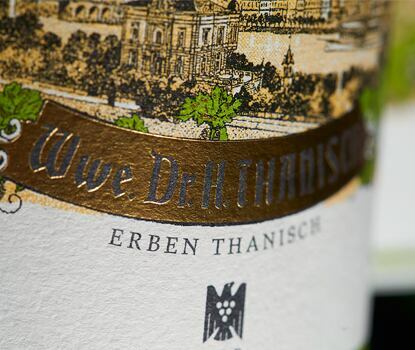
KABINETT
THANISCH ESTATE RIESLING KABINETT
The Estate Riesling comes mainly from vineyards around Kues, on the left bank of the Mosel. Aromas of lemon, lime and pepper herald a supple, pliant palate of white peach, green apple and lemon zest. 10% abv. Bottled in April 2022 under screwcap.
Corney & Barrow Score 17.5
Recommended drinking from 2023–2027
£105/CASE OF 3 MAGNUMS, IN BOND UK
BERNKASTELER-KUES RIESLING ALTE REBEN
The alte reben (old vines) here are over 40 years old. This ranks between the estate wine (above) and the single vineyards (below). White flowers, green citrus and lemon rind aromas, with slaty minerality. A palate-cleansing attack, textured and racy on the mid-palate, coming to a fine, focused point. 11% abv. Bottled in April 2022, under screwcap.
Corney & Barrow Score 17+
Recommended drinking from 2023–2028
BERNKASTELER BADSTUBE RIESLING KABINETT
The more generous sibling of the Feinherb (below). The only difference is the length of fermentation, which here is halted earlier, making this a touch richer and allowing a lovely low alcohol level of 8% abv. Candied citrus and fresh lime, with wet-stone minerality. Hard to think of a better bottle for a warm summer’s day. Bottled under screwcap.
Corney & Barrow Score 17 +
Recommended drinking from 2023–2032
BERNKASTELER BADSTUBE RIESLING KABINETT FEINHERB
This ferments for slightly longer than the ‘straight’ Kabinett (above), resulting in a marginally drier style. Pronounced slaty mineral aromas, with clean green citrus fruit. The palate is juicy and supple on the attack, finding a tangy focus on the mid-palate, with a slaty-mineral bite and texture to the finish. 10% abv. Bottled under screwcap.
Corney & Barrow Score 17.5
Recommended drinking from 2023–2030
BERNCASTELER DOCTOR RIESLING KABINETT
The Doctor Kabinett: is it too much to call this a Mosel legend? I don’t think so. Fine, slaty minerality on the nose, with a sherbety, lime-rind zest. The palate is luminous, with a perfectly visible skeleton of minerality and dry extract. A lovely low 7.5% abv. Bottled at the end of May. Christina Thanisch thought this was just starting to open at the time of our tasting in August 2022. A third less than usual was produced in 2021 – only around 2,000 bottles.
Corney & Barrow Score 18.5
Recommended drinking from 2026 - 2038
£185/CASE OF 3 MAGNUMS, IN BOND UK
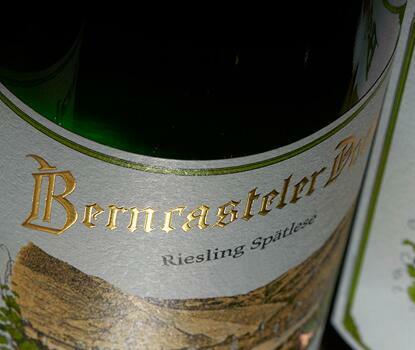
SPÄTLESE
BERNKASTELER BADSTUBE RIESLING SPÄTLESE
As Christina Thanisch says, “this is a wine I could just drink now.” Lemon and lime rind, with wet-stone minerality, this is a mere 8% abv and was fermented a little longer than usual, resulting in a drier style. Candied tension to the finish. This will keep but it’s so tempting to enjoy it early.
Corney & Barrow Score 17 - 17.5
Recommended drinking from 2023–2035
BERNCASTELER DOCTOR RIESLING SPÄTLESE
From the majestic Doctor vineyard, which looms beneficently over you as you taste at the estate. Aromas of white flowers and zesty lime. The palate is joyfully energetic, with a nice sherbety zing detailing the Doctor’s extra notch of fruit ripeness. Fine-boned tension to the finish, wonderful. 8% abv.
Corney & Barrow Score 18.5
Recommended drinking from 2025–2038
£245/CASE OF 3 MAGNUMS, IN BOND UK
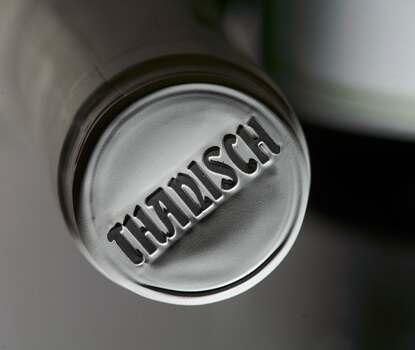
AUSLESE
Meaning ‘selected harvest’, Auslese is another notch up in volume. Auslesen may also have some botrytis, or ‘noble rot’, contributing to the sense of honeyed richness. In the best examples, this is offset by the Mosel’s signature high-line of taut acidity. Just one barrel of Auslese was made in 2021, meaning this will be gone in a flash!
BERNCASTELER DOCTOR RIESLING AUSLESE
This is a real rarity in 2021, just one barrel of Auslese-level wine having been produced at the estate. Lime, peach and apricot aromas. This is an astonishingly airy, elegant Auslese, with smoky-slaty minerality and wet-stone purity. The palate is taut and nervy, with lemony acidity and phenolic bite. Fruit ripeness lingers on the long, focused finish. 7.5% abv.
Corney & Barrow Score 18+
Recommended drinking from 2027–2045
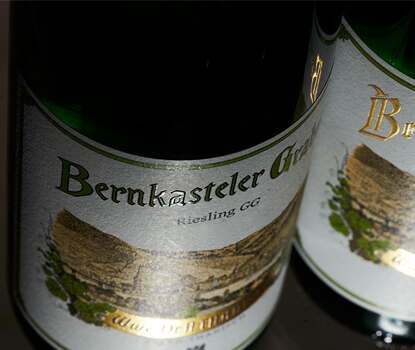
GROSSES GEWÄCHS
These two wines sit apart from the rest of the Thanisch line-up in that they are totally dry. As such, they are labelled Grosses Gewächs, or ‘GG’s, a pan-German term for the highest quality tier of dry wines, which come from Grosse Lage sites (similar to Burgundy’s Grands Crus). The system started in the Pfalz and Rhine some 25 years ago but was not adopted in the Mosel until around a decade ago. Some producers, including Thanisch, choose to use the word trocken on the label also, to underscore that these are bone dry wines.
BERNKASTELER GRABEN RIESLING GROSSES GEWÄCHS (TROCKEN)
Bernkasteler Graben is a cooler site, adjacent to the Doctor vineyard. As Christina explains it, the style of Graben is “really straight and clear”. The vines here are 60-80 years old. The family has a 0.5 hectare holding here, all of which is used for the GG. This is cool, focused and steely on the nose. The citric palate revels in lime zest, with a tangy, grapefruity finish. Crisp and cleansing, with serious ageing potential ahead. 12% abv. Bottled in July 2022. The whole production fits in one old oak foudre and one stainless steel tank.
Corney & Barrow Score 17.5 - 18
Recommended drinking from 2025–2040
BERNCASTELER DOCTOR RIESLING GROSSES GEWÄCHS (TROCKEN)
One of the top sites of the Mosel, the Doctor is a warmer vineyard, which combines fruit ripeness and fine, elegant minerality. This has a more generous fruit presence than the Graben GG, with a disarmingly intricate, lacy texture. Finely hewn, sherbety and clipped, with a long finish of ripe citrus fruit, compressed extract and slaty minerality. Bravo Christina and Sofia. 12% abv.
Corney & Barrow Score 19
Recommended drinking from 2025–2040
£250/CASE OF 3 MAGNUMS, IN BOND UK
